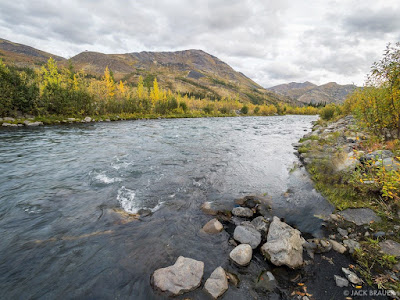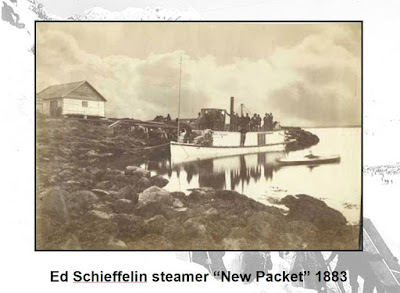August 7, 2021
For the next several Saturdays, the QB will be going “North to Alaska” (but not with Johnny Horton).
The river fashioned the land, and the river ground down the gold. The specific gravity of gold is 19 times that of water, so the gold sank and was caught in the sandbars at the mouths of streams. The coarser gold moved for lesser distances: as soon as the pace of the current began to slacken, it was trapped in the crevices of bedrock.
 |
| The Klondike River |
And there the gold lay scattered for the full length of the great Yukon River. There was gold on a dozen tributary rivers and a hundred creeks which would remain nameless and unexplored until the gold was found.
In the Klondike Valley gold lay more thickly than on any other creek or river in the whole of the Yukon watershed – so thickly, indeed, that a single shovelful of paydirt could yield $50,000 – at today’s market – worth of dust and nuggets.
The Russians were the first on the river, in 1834. Stories of gold had reached the ears of Alexander Andreyevich Baranov, the first governor of Russian Alaska. But Baranov, garnering a fortune in furs for his Czarist masters, was not anxious for a gold rush.
Alaska was purchased by the United States from Russia in 1869 for $7.2 million ($200 million today, adjusted for inflation) or 2 cents an acre. The amount of gold recovered to date is 250 times that much. Along the long strip of coastal land named “The Panhandle,” gold was discovered in 1880 – hardrock gold – and the mining town of Juneau sprang up, the springboard to Alaska and the Canadian Yukon.
 |
| The check which purchased Alaska |
The men who sought Yukon gold crept in upon it from three sides:
In 1873 Arthur Harper came in from the interior of northern Canada.
In 1878 George Holt pushed directly in from the seacoast through the Chilkoot Pass.
In 1882 Ed Schieffelin went around to the Bering Sea opposite Siberia and moved up the long water highway of the Yukon River itself.
George Holt did not find gold on the Yukon. Holt was the first white man to climb the Chilkoot Pass. In 1878 he emerged with two small nuggets which an Indian had given him, and his tales, embroidered by his own imagination, excited the interest of the men at Sitka, the Panhandle capital. Gold was found in Juneau in 1880, and the Treadwell mine became the richest in the world.
 |
| "The Golden Trail" up the Chilkoot Pass |
In the spring of 1883 Ed Schieffelin hired the steamer New Packet to sail into the Yukon from St. Michael, the old Russian port on the Bering Sea. For a 1000 miles the steamer struggled against the current, but he returned to St. Michael empty handed. And so, as it had eluded Harper and Holt, the gold of the Yukon eluded Schieffelin.
Arthur Harper, Al Mayo a onetime circus acrobat, and Jack McQuesten founded Fort Reliance trading post on the Yukon. Their post was such a point of reference, that prospectors named creeks and rivers in reference to their distance from Fort Reliance, as in Sixtymile River and Fortymile River.
By 1886 some 200 miners had gradually worked their way to the mouth of the Stewart River, where they panned, in a single year, $100,000 worth of fine placer gold – easily mined by any man with a shovel and a pan and a strong back. Confident that the number of prospectors would increase, McQuesten left for San Francisco to order more supplies.
That winter two prospectors tried Fortymile River. They found good coarse gold that rattled in the pan, the kind that every miner seeks. As would happen over and over, men along the Stewart deserted their diggings and flocked to the new strike. Harper knew that unless McQuesten increased his order or there would be starvation along the Yukon.
A prospector named George Williams, together with an Indian companion set off. By the time they reached the Chilkoot their rations had petered out and their dogs were dead. The two finally reached the shelter of a trading post run by a onetime Montana sheriff named John Jerome Healy.
 |
| Sheriff Healy |
Williams lived two days The men who crowded around his deathbed had one question: why had he made the trip? The Indian reached into a sack of beans on Healy’s counter and flung a handful on the floor. “Gold,” he said. “All same like this!”
Prospectors were all individuals, as their nicknames indicated: Salt Water Jack, Big Dick, Squaw Cameron, Jimmy the Pirate, Buckskin Miller, Pete the Pig.
Eccentrics were the rule rather than the exception.
There was one called Cannibal Ike because of his habit of hacking off great slabs of moose meat with his knife and stuffing them into his mouth raw.
One cabin contained three partners and a tame moose which was treated as a house pet.
The stampeders typically didn’t bother anyone who left them alone. Where else but in the Yukon could a man attempt to cut his throat in plain view without anyone interfering? One man did just that; his name was Johnson, and he made a bad job of it because he was drunk. The onlookers, seeing that he was obviously failing in his plan, patched him up, then told him courteously that he might try again if he wished. He rejected the idea, grew a villainous black beard to hide his scars, and reveled ever after in the nickname of Cut-throat Johnson.
Next week, on to the Klondike.
👉 Today’s close is from The Songs of Jesus, by Timothy Keller.
“He rebukes them in his anger and terrifies them in his wrath, saying, ‘I have installed my king on Zion, my holy mountain.’ I will proclaim the Lord’s decree: He said to me, ‘You are my son; today I have become your father. Ask me, and I will make the nations your inheritance, the ends of the earth your possession. You will break them with a rod of iron; you will dash them to pieces like pottery.’ Therefore, you kings, be wise; be warned, you rulers of the earth. Serve the Lord with fear and celebrate his rule with trembling. Kiss his son, or he will be angry and your way will lead to your destruction, for his wrath can flare up in a moment. Blessed are all who take refuge in him” ( Psalm 2:5-12).
God’s response to human pride and power is to install his “son” on Zion. This points beyond Israel’s king to Jesus, God’s true Son. One day he will put everything right; but he did this by going first to Zion – to Jerusalem – to die for our sins. To “kiss his son” is to rest in and live for him. If we do this, we have assurance that no matter what happens to us, ultimately everything will be all right. If we don’t live for him, we end up fighting God himself. So “there is no refuge from him – only in him.”
Prayer: Lord, your answer to the chaos and strife of the world is your Son, Jesus Christ. He will eventually break brokenness, kill death, destroy destruction, and swallow every sorrow. Teach me how to take refuge in you – in your forgiveness through Jesus, in your wise will, and in my assured, glorious future. Amen.
-30-










No comments:
Post a Comment